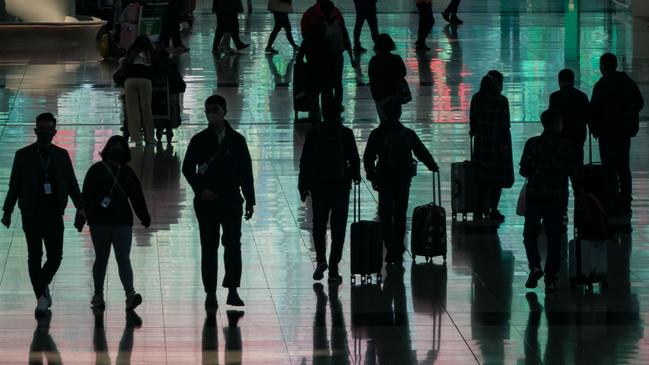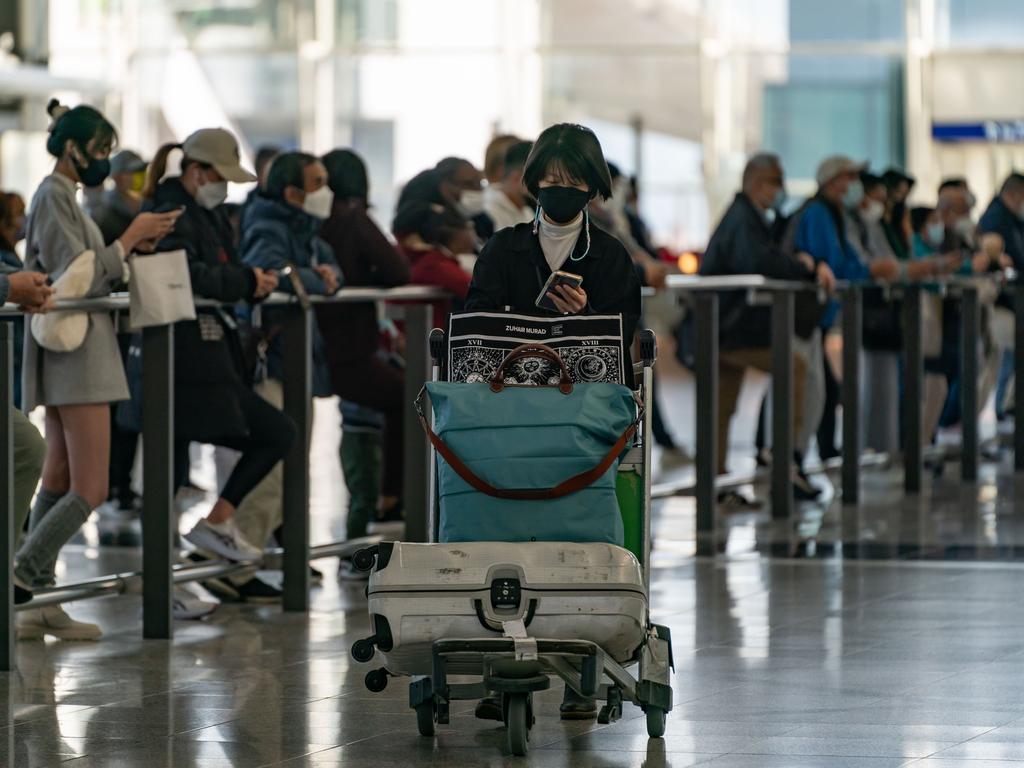
After suddenly abandoning its harsh lockdown approach, China is facing an explosion of cases infecting tens if not hundreds of millions of people. Swamped by a tidal wave of contagion, testing and case reporting have been dramatically reduced.
The Chinese administration has never been transparent in sharing viral genomic sequence data. The risk is new variants may emerge across a population that has been inadequately vaccinated and has not built a level of immunity. The US Centres for Disease Control and Prevention made the clearest case for testing: “Pre-departure testing and the requirement to show a negative test result (have) been shown to decrease the number of infected passengers boarding (aeroplanes), and it will help to slow the spread of the virus as we work to identify and understand any potential new variants that may emerge.”
There is no comparable clarity in Australia’s position. On Sunday and Monday, Health Minister Mark Butler was determined to say nothing that might be implied as criticism of China. Butler said: “There is a broad consensus among all of the jurisdictional chief health officers and chief medical officers that the resumption of travel between China and Australia poses no immediate public health threat to Australians.” Moreover, he claimed: “It’s clear from the chief health officer advice that it appears that the Omicron subvariant BF.7 that appears to be driving the wave right now in China has been present in Australia for several months, probably since the middle of 2021.” So why require tests? Only because of “an abundance of caution”, a phrase Butler used five times. That and “the absence of comprehensive information about the situation in China right now”, which he stressed was the view of the World Health Organisation, in case any one should accuse our Health Minister of having his own view.
How will tests be verified? What will happen if a person arrives with symptoms? Butler’s answer on Sunday was to point people to the government’s Smartraveller website. Late on Monday that site said “updates on the implementation of these changes” would be available on the Department of Health and Aged Care website, but the “health alerts Covid-19” page hasn’t been updated since November 25. Such are the challenges of managing a stabilised relationship with China. The government won’t even imply Beijing might be doing something damaging to Australian interests out of concern that such comments might trigger a bad reaction from the Chinese Communist Party.
The English-language versions of China’s major newspapers are struggling to rationalise Xi Jinping’s rapid policy shifts on Covid since the end of the 20th party congress last November. The CCP has shifted from saying there will be continuity in strict lockdowns to a slow and phased opening, to the current approach that accepts community-wide infection is inevitable. It’s difficult to claim these shifts represent careful policy so much as just accepting the unavoidable and hoping to get the wave of infections over as soon as possible. A “let it rip” approach exposes Beijing’s failure to adequately inoculate the population with vaccines that work.
After his personal consolidation of power at the 20th party congress, Xi was probably hoping for a better start to 2023. As it is China faces a difficult winter and spring as the virus swamps hospitals, aged-care facilities and, sadly, crematoriums. CCP-controlled media has reacted with condemnations of foreign governments that have announced Covid-related restrictions in response to the opening of travel from China on January 8.
The People’s Daily editorialised on December 30: “The absurd, bloated and irresponsible smearing of China was only another episode of the farce by a few Western media with their deep-rooted bias, arrogance and double standards.”
The Global Times acknowledged “there will be pains in China’s transition period, but the day the West wants to see – when China is trapped in a worse quagmire of the epidemic than the West – will not come.” A Global Times editorial of December 29 hints at what may be a central CCP concern: the impact on domestic stability of the new infection wave. It acknowledges “Omicron did cause a shocking wave in China”, such that “by the end of 2022, there are problems and imperfections. Neither is there social turmoil in China, expected by the West. Some people have complaints, but most trust the government. Because the achievements made over the past three years are solid, thanks to China’s institutional advantages.”
CCP anxiety about the risk of social turmoil is never far under the surface. Significant instances of public dissatisfaction with the lockdowns were visible last November and December. Mass protests are not uncommon in China. What has been remarkable about protests over Covid is the criticism has been directed at Beijing’s management and the role of the most senior party officials. In late November, the BBC reported on a protest in Shanghai: “People were heard openly shouting slogans such as ‘Xi Jinping, step down’ and ‘Communist Party, step down’.”
That is highly unusual. Not since Tiananmen Square in 1989 have we seen such widespread challenge to the CCP’s top leadership. This means the first half of 2023 could be very difficult for Xi.
Much depends on the public reaction to the wave. The leadership cannot hide from a broadly felt negative reaction to its Covid policies if many people across the country succumb to the virus. How the CCP deals with this remains to be seen but the standard approach has been to blame the international community and try to shift the public focus on to an external enemy. Reading Chinese newspapers provides plenty of evidence both things are happening. This is the broader context in which the Albanese government will have to manage its stabilisation of relations with China.
The Wong-Albanese mantra is: “We will co-operate with China where we can, we will disagree where we must and we will engage in our national interest.” Barring fundamental and unlikely changes in Xi’s approach, there will be many more opportunities where Australia is forced to disagree with China than there will be to co-operate. That is the reality of our strategic outlook. Beijing has changed none of its aims and objectives, notwithstanding a toning down of the harsher parts of wolf warrior diplomacy.








The Albanese government’s decision to require a negative Covid test before admitting travellers from China is an early trial of the goal to stabilise relations with Beijing. Requiring a verified negative pre-departure test is without doubt the right policy choice, now being implemented by many countries including the US, Japan, Italy, Britain, Canada, France and South Korea.